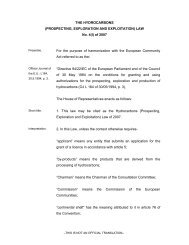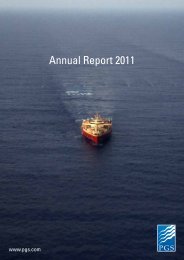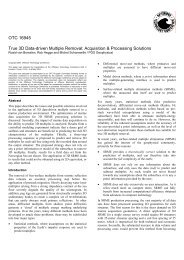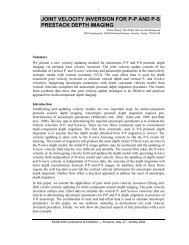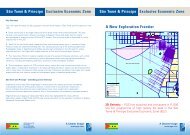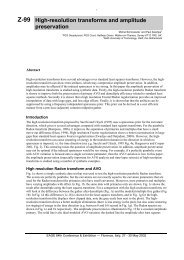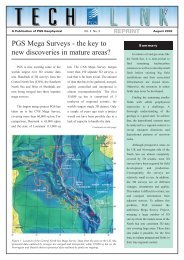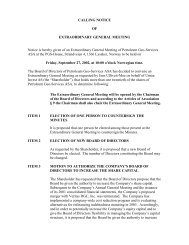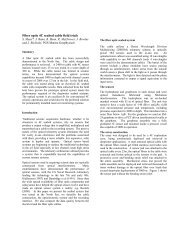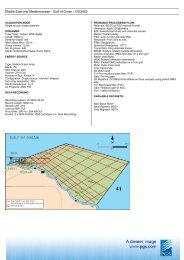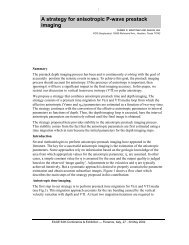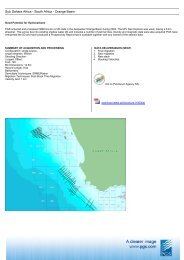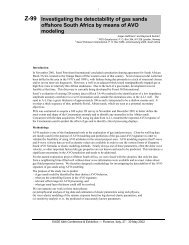Arrow Prospectus - PGS
Arrow Prospectus - PGS
Arrow Prospectus - PGS
You also want an ePaper? Increase the reach of your titles
YUMPU automatically turns print PDFs into web optimized ePapers that Google loves.
ARROW SEISMIC ASA – INITIAL PUBLIC OFFERING<br />
Rates of UK Corporation tax<br />
The standard rate of UK corporation tax for large companies is currently 30% (for the year commencing 1 April<br />
2007). It is likely given the number of associated companies of the group that each company will be large for UK<br />
corporation tax purposes.<br />
The Draft UK Finance Bill 2007 includes provisions that will reduce this standard rate to 28% from 1 April<br />
2008. These regulations are yet to be enacted by Parliament and remain subject to potential change. There also<br />
exist other relevant amended provisions which if enacted will impact UK corporation tax, particularly with<br />
regard to tax depreciation.<br />
If an accounting period does not coincide with the financial year, the profits for the accounting period are time<br />
apportioned and the appropriate rate applied to each part.<br />
Capital gains<br />
Capital gains on chargeable assets are taxed at normal corporation tax rates. For UK tax purposes a capital gain<br />
is usually calculated on the basis of the excess of the sale proceeds over the original cost, plus any qualifying<br />
subsequent expenditure incurred on the asset. An allowance is allowed with respect to inflation limited to years<br />
from 1982. This may only be used to eliminate a gain and not to create a loss.<br />
When a capital gain arises on the disposal of a ship, the gain may be held over into the tax base cost of a new<br />
business asset if the proceeds received from the disposal of the ship are used to acquire the new asset. The new<br />
asset must in general be acquired in the period beginning twelve months before and ending three years after the<br />
disposal of the ship. The held over gain will then crystallise at the earlier of 10 years from acquisition and the<br />
eventual disposal of the new asset.<br />
Determining trading profits<br />
General<br />
The assessment of trading profits for tax purposes is based on the financial statements in accordance with<br />
generally accepted accounting principles. This includes International Financial Reporting Standards accounts.<br />
Expenses must be incurred wholly and exclusively for the purposes of the trade of the company whose profits<br />
are being assessed. No deduction is allowed for entertainment purposes apart from specific staff entertainment.<br />
Corporate debt and foreign exchange rules<br />
The rules under the corporate debt regime are designed to allow a tax treatment of interest, discounts and<br />
premiums on debt instruments to follow the accounting treatment in most circumstances, subject to certain<br />
exceptions and anti-avoidance provisions.<br />
Most foreign exchange differences are taxable or relievable in accordance with the correct accounting treatment.<br />
Specific rules apply with respect to a hedging function depending on the accounting used.<br />
Tax depreciation (capital allowances)<br />
UK accounting depreciation is generally not allowed as a deduction for tax purposes. This is replaced by<br />
specific capital allowances which are deductible for UK tax purposes. The standard allowance on plant and<br />
machinery is 25% on a reducing balance basis (likely to be 20% from 2008). Most assets with a useful economic<br />
life of 25 years (long life assets) are allowed a different allowance using a declining balance method at an annual<br />
rate of 6% per year (likely to be 10% from 2008). The allowances are generally allowed on a per annum basis<br />
from when the asset is brought into use.<br />
Ships are, however subject to special treatment for capital allowances outside the long life assets regime. This<br />
exemption from the standard long life asset treatment is due to expire on 1 January 2011. For special treatment<br />
to apply ships must be seagoing and over 100 gross registered tons or more.<br />
When a trader incurs expenditure on the provision of a ship for the purpose of a trade, he is regarded and having<br />
incurred that expenditure for the purposes of a separate trade. The expenditure on each ship is recorded<br />
74



